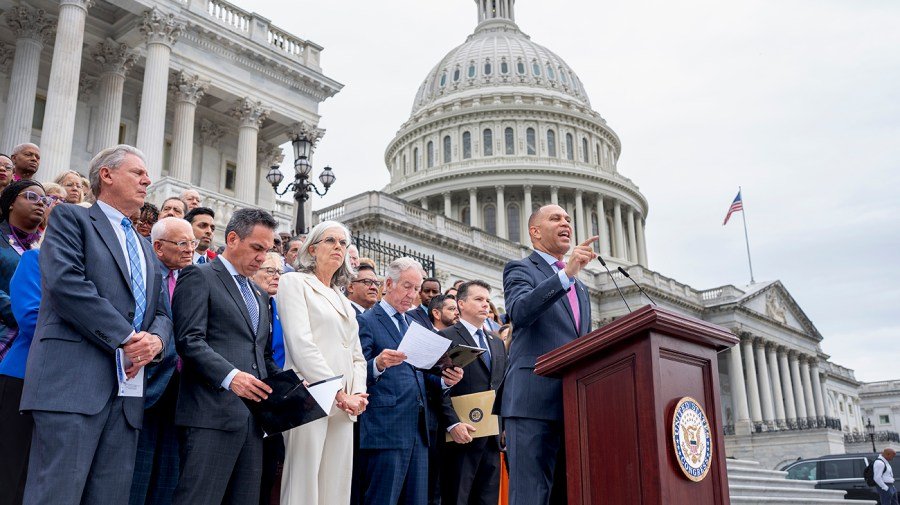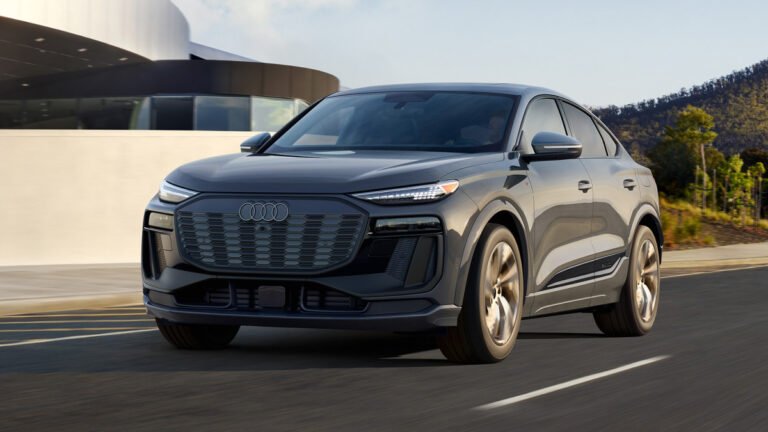
Nearing the six-month mark of President Trump’s frenetic second term, Democrats are fighting to find their footing and claw themselves from the wilds of the minority in next year’s midterm elections.
On the bright side, Democrats in both chambers were unanimous this month in their opposition to Trump’s megabill of domestic priorities — a massive package of social spending cuts and tax benefits that Democrats hope will serve as a powerful messaging tool as they battle to regain the support of disgruntled working-class voters who have shifted allegiances to the GOP.
But they also have good reason to worry. Not only do polls show the Democrats’ approval ratings at historic lows, but they’re still scrambling to identify a national leader almost half a year after Trump’s return to the White House — dynamics that are raising alarm bells in certain corners of the party.
“Sadly, Democrats are still stuck in the same mud that they were in six months ago,” said Democratic strategist Brad Bannon. “We are still as unpopular as we were when Trump was inaugurated in January.”
Another strategist was even more grim.
“This is a nightmare scenario for the Dems right now,” the strategist said. “We better pray long and hard that the country is going to be in a f‑‑‑ing depression because I don’t know how else we find ourselves out of this mess.”
A new poll by a Democratic super PAC highlights the challenges facing Democrats as they race to regroup in the era of MAGA 2.0. The survey, conducted by Unite the Country, found not only that Democrats have failed to gain ground on Trump this year, but they’re less popular now than they were when he was elected in November.
Voters, the group found, view Democrats as “woke,” “weak” and “out of touch.”
“It’s hard to message when you’re in the wilderness, which is what we are right now,” said Democratic strategist Rodell Mollineau, who serves as senior adviser to the super PAC. “When voters don’t think that you care about their issues, and they don’t think that you’re going to fight for them, that becomes a problem.”
Complicating the Democrats’ task, the disruptive rifts between the party’s ideological wings since Trump took office have been glaring in their prominence — and very slow to heal.
On one side of that split are more moderate Democrats pressing the party to avoid the culture wars and focus on issues of economic and national security — a pragmatic formula, they say, to win over centrist voters in the battleground districts they’ll need to win back control of Congress.
On the other side are liberals who want to confront Trump on all the many contentious issues — including the cultural battles around immigration, transgender rights and the diversity, equity and inclusion movement — that energize the party’s progressive base. Given Trump’s bellicose efforts to tear down those institutions, they say, nothing short of a hair-on-fire urgency will do.
Those battle lines have been glaring in two recent headline-churning episodes: The exile of David Hogg — a young, progressive gun control activist — from the leadership ranks of the Democratic National Committee and the victory by Zohran Mamdani — a self-described Democratic Socialist — in the Democratic primary race to become the next mayor of New York City.
The Big Apple doesn’t define the country — and Mamdani doesn’t define the party — but that won’t stop Republicans from making the case that it’s so.
“National Democrats are happy and proud to have socialists, criminals, and antisemitic radicals who chant ‘globalize the intifada’ in their ‘big tent,’” said Mike Marinella, spokesperson for the Republicans’ campaign arm, on Thursday in an effort to make Mamdani the face of the Democrats. “This is their party, and every House Democrat is proudly applauding the far-left takeover.”
Democrats have a simple strategy for deflecting those attacks: They’re focusing virtually all their energy and attention on the most contentious provisions of Trump’s megabill, which he signed into law July 4.
Medicaid is central to the effort.
The Republicans’ legislation would cut the low-income health program, which covers more than 70 million Americans, by roughly $1 trillion over a decade, leading to millions of people losing their health coverage, according to the Congressional Budget Office. Meanwhile, the tax cuts also featured in the bill shower the lion’s share of benefits on the wealthiest Americans.
Democrats have already spent months attacking the bill as a massive transfer of wealth from the poor to the rich. Now that virtually every GOP lawmaker has voted to send it to the president, that campaign is only going to heat up. And the focus of those attacks will be the vulnerable Republican lawmakers who had vowed to oppose the package over the Medicaid cuts, then flip-flopped and voted for it anyway.
That formal support, Democrats hope, will alienate voters even if the Medicaid cuts aren’t slated to take effect until early 2027 — after the midterms.
“Through meaningless letters and performative tweets, the so-called Republican moderates have admitted their Big, Ugly Bill would obliterate Medicaid and decimate rural hospitals. Now they want voters to believe that delaying some of the damage until after the midterms somehow makes their vote to rip health care from 17 million Americans more acceptable?” said Justin Chermol, spokesperson for the Democrats’ campaign arm.
“Give me a break.”
Republicans have dismissed the attacks as disingenuous political “fearmongering,” arguing that the Medicaid cuts contained in the bill focus exclusively on enforcing work requirements for able-bodied adults, blocking benefits for immigrants living in the country illegally, and weeding out waste, fraud and abuse — all provisions that are relatively popular with voters across ideological lines.
Still, Trump’s bill is highly unpopular in its own right, according to recent polls. And Bannon, the Democratic strategist, agreed the megabill — combined with contentious executive policies like mass deportations and economy-rattling tariffs — provide Democrats with an opportunity to turn the ship around and build the party’s brand heading into next year’s midterms.
“Because of MAGA missteps, Democrats now finally have tools to use to build a new foundation,” Bannon said.
“The secret sauce for the opposition is to use the Medicaid cuts, immigration deportations and high tariff taxes to blister Trump for his failure to keep his campaign promise to bring down high prices on the first day of the second administration.”





